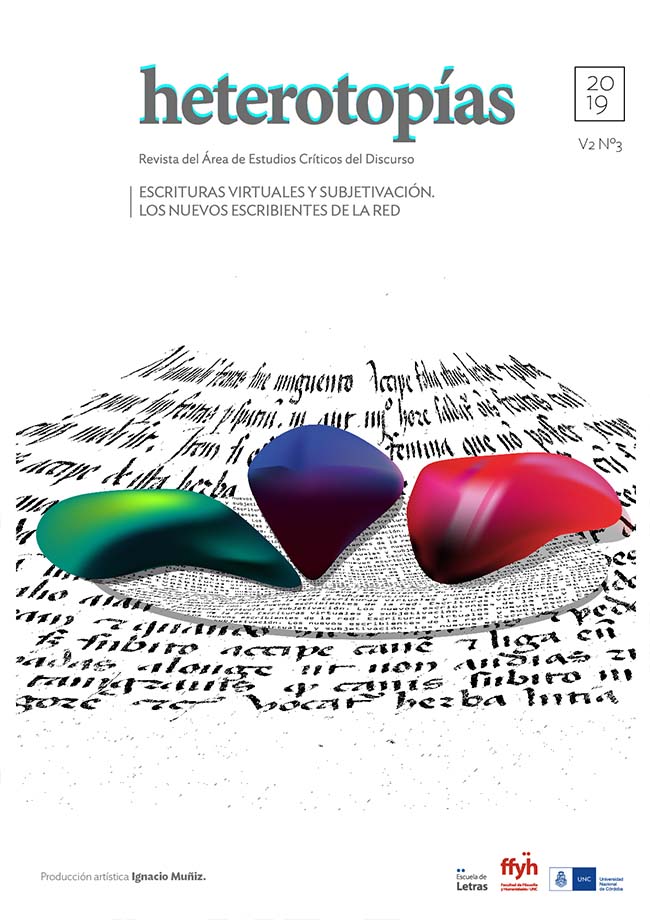Inscriptions on the public scene: citizen voices in the online debate over REPSOL - YPF
Main Article Content
Abstract
This article analyzes the discourse operations deployed by Argentine Internet users in the controversy about the expropriation of Repsol YPF's shares that took place in 2012. The debate had an important developement in the most popular social networks of the moment: Facebook and Twitter. In this case, I specifically consider the resources with which users express empathy or rejection towards the Government’s decision. The participant´s strategies link the voice of the citizens with the word of the leaders and tend to consolidate or to undermine a particular type of collective political - fleeting, passionate, unstable-: online communities.
Downloads
Article Details
Those authors who have publications with this journal, accept the following terms: Those authors who have publications with this journal, accept the following terms:
a. The authors will keep their copyright and guarantee to the journal the right of first publication of their work, which will be simultaneously subject to the Creative Commons Attribution - Non-Commercial - Share Alike (by-nc-sa) Attribution License; no commercial use of the original work or any derivative works is allowed, the distribution of which must be done with a license equal to the one that regulates the original work.
b. Authors may adopt other non-exclusive license agreements for the distribution of the published version of the work (e.g., deposit it in an institutional telematic archive or publish it in a monographic volume) provided that the initial publication in this journal is indicated.
c. Authors are allowed and recommended to disseminate their work through the Internet (e.g. in institutional telematic archives or on their website) before and during the submission process, which may lead to interesting exchanges and increase the number of citations of the published work. (See The effect of open access).
How to Cite
References
Amossy, R. (2010). Polemical Discourse On TheNet: “Flames” In Argumentation. ISSA proceeedings. Recuperado de http://rozenbergquarterly.com/issa-proceedings-2010-polemical-discourse-on-the-net-flames-in-argumentation/.
Amossy, R. (2011). La coexistence dans le dissensus. Semen, 31. Recuperado de http://semen.revues.org/9051.
Borges, J. L. (1933). El arte de injuriar. En Obras Completas. Buenos Aires: Emecé.
Calvo, E. (2015). Anatomía política de Twitter en Argentina. Twiteando #Nisman. Buenos Aires: Capital Intelectual.
Lewinski, M. (2010). Internet political discussion forums as an argumentative activity type. A pragma-dialectical analysis of online forms of strategic manoeuvring in reacting critically. The Netherlands: Rozenberg Publishers.
Maingueneau, D. (2010). Types of genres, Hypergenre and Internet. En Luzon, M-J., Ruiz-Madrid, M-N. y Villanueva, M-L. (Eds.). Digital Genres, New Literacies and Autonomy in Language Learning (pp. 25-42). Cambridge Scholars Publishing.
Maíz Arévalo, C. (2013). Just click ‘like’: Computer-mediated responses to Spanish
Compliments. Journal of Pragmatics, 51. Recuperado de http://www.sciencedirect.com/science/article/pii/S0378216613000799.
Mancera Rueda, A. (enero, 2014). Cortesía en 140 caracteres: interacciones en Twitter entre periodistas y prosumidores. Revista de Filología, 32. Universidad de La Laguna.
Menna, L. (2012). Nuevas formas de significación en red: el uso de las #etiquetas en el movimiento 15M. Estudios de lingüística en español, 34. Barcelona: Universidad de Barcelona.
Miller, V. (2015). Phatic culture and the status quo: Reconsidering the purpose of social media activism. Convergence: The International Journal of Research into New Media Technologies, pp. 1-19. Recuperado de https://journals.sagepub.com/doi/abs/10.1177/1354856515592512.
Piglia, R. (10 de octubre, 1991). La ficción paranoica. Clarín. Suplemento Cultura y Nación.
Sorj, B. y Fausto, S. (2016). Activismo político en tiempos de Internet. São Paulo, Edições Plataforma democrática. Recuperado de http://www.plataformademocratica.org/Arquivos/Activismo_politico_en_tiempos _de_internet.pdf.
Tabachnik, S. (2012) Lenguaje y juegos de escritura en la red. México: Universidad Autónoma Metropolitana.
Twitter. (2014). El Blog de Twitter en español. Recuperado de https://blog.twitter.com/es/espanol.
Varela, G. (2013). Nuevas formas visitadas de la injuria política: la argumentación en los libelos audiovisuales de Youtube. Recuperado de http://semioticadelosmedios2.sociales.uba.ar/?page_id=254.
Vivas Marquez, J. (2014). La cortesía valorizadora en las redes sociales. Análisis de un corpus de publicaciones en Facebook y Twitter. Pragmalingüística, 23. Universidad de Cádiz. Recuperado de https://revistas.uca.es/index.php/pragma/article/view/1988.
Weisbrot, M. (18 de abril, 2012). Argentina's critics are wrong again about renationalising oil. The Guardian. Recuperado de https://www.theguardian.com/commentisfree/cifamerica/2012/apr/18/argentina-critics-oil-nationalise.
Zappavigna, M. (2012). Discourse of Twitter and Social Media. Londres: Continuum
